|
| |
This week in: Peace & Security Publications |
IPSI | Africa | Americas | East Asia | Middle East | South Asia
|
|
|
|
| |
This week in Peace & Security Publications
|
|
|
|
| |
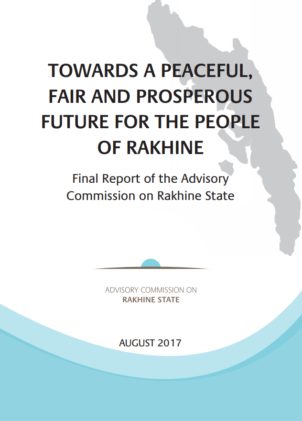
Advisory Commission on Rakhine State: In September 2016, following a request from Daw Aung San Suu Kyi, the State Counsellor of Myanmar, the Kofi Annan Foundation and the Offi ce of the State Counsellor established an Advisory Commission…
|
|
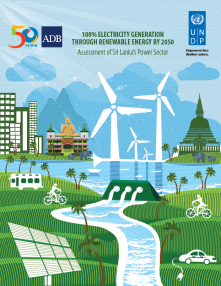
UNDP: This report has been developed with the purpose of designing and proposing scenarios and mechanisms through which the goal of 100 percent RE in electricity generation by 2050 can be achieved. It details among other things…
|
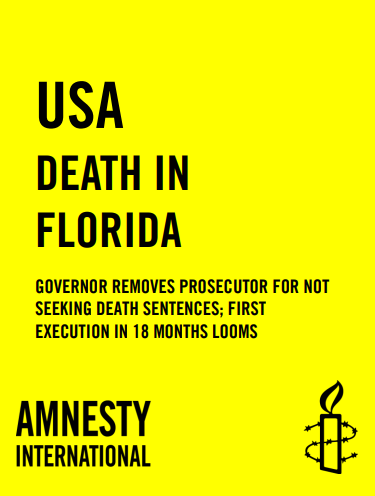
Amnesty International: In March 2017, Governor Rick Scott responded to a State Attorney’s decision not to pursue the death penalty because of its demonstrable flaws by ordering her replacement with a…
|
|
|
|
|
|
| |

Sarajevo Blogs! Experience the Sarajevo Symposium on Post-Conflict Transitions through the eyes of the participants in their daily blog!
|

Bologna Blogs! Learn more about Bologna Symposium by reading our blog written by participants from this summer!
|
|
|
|
|
|
| |
This week in Sub-Saharan Africa
|
|
|
|
| |
ANGOLA: Ruling party (MPLA) claims disputed general election by more than 60 percent
On Thursday, the ruling party (MPLA) claimed victory by more than 60 percent in Angola’s general election after polls opened on Wednesday. The opposition parties have disputed their claim, citing their own estimated results. The official results must be released within 15 days following the polls closing this Saturday. Comment: Each party posts a member to each polling site to estimate the vote count, allowing for potential discrepancies among parties prior to the official count’s announcement. But with new media restrictions favoring the MPLA, Human Rights Watch has stated that the election has been “marred by severe restrictions on freedom of expression and assembly.” The MPLA has never lost an election in Angola’s 25 years since reestablishing a multiparty democracy. (Africanews, Al Jazeera, BBC, The Guardian)
|
|
|
|
|
| |
BURUNDI: Grenades detonate in bars, killing at least three, wounding 27 in Bujumbura
Late last Thursday night, grenades were tossed into two bars in the Buyenzi district in Bujumbura, Burundi’s capital. At least three people were killed by the explosions, including one who died on-site, with 27 others remaining hospitalized. An anonymous survivor reported that the attackers made no effort to rob anyone. Comment: While no group has taken credit for the attack, Burundi has experienced greater amounts of political violence since President Pierre Nkurunziza began seeking his third term in office in 2015. A third bar in the Buyenzi district was also attacked last month. (Africanews, Al Jazeera, Reuters)
|
|
|
|
| |
TOGO: Security forces break-up protests, killing two and wounding 13 other protesters
On Saturday, two parallel protests in Lome, Togo’s capital, and Sokode (north of Lome) were dispersed by security forces. While the Lome protest dissipated after security forces used teargas, live ammunition used in the Sokode protest killed two and wounded 13 others; 12 police officers were also injured. Comment: Protesters bore the opposition party’s (PNP) red colors and proclaimed “Fifty years is too long!” Their actions attempted to reintroduce term limits following more than 50 years of rule by President Faure Grassingbe and his father, Gnassingbe Eyadema. (Africanews, Al Jazeera, Reuters)
Researched/Written by Angelica Aimé Silfa
|
|
|
|
|
| |
This week in the Americas & Caribbean
|
|
|
|
| |
ARGENTINA: Thousands of workers protest against President Macri’s economic policies
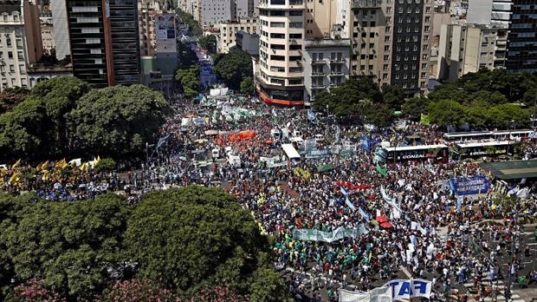
|
|
On Tuesday, tens of thousands of workers and labor union members took to the streets of the capital in protest against President Mauricio Macri’s recent economic policies. These policies are deemed “repressive” due to the loss of more than 160,000 jobs, the rise of prices of medicine and other basic goods, and the opening of markets to foreign goods that ensued. Macri’s government argues that the protest is a result of a “crisis” of trade unionism and considers the demonstration to be an “error” and a waste of time. On Wednesday, the President fired his Deputy Labor Minister and supervisor of Health Services, who controlled the attribution of money to the unions and organizations for public works. Comment: Since taking office in 2015, Macri implemented austerity programs across numerous sectors of the country’s economy. The economic reforms include lower labor costs designed to attract investment and jump-start an economy that just emerged from recession last year. Unions fear more drastic changes after the mid-term elections in October, especially since a primary vote on August 13 showed strong support for Macri’s coalition. The General Confederation of Labor (CGT), Argentina’s largest union federation, announced it is planning a second national general strike for October 22, just weeks before the election. (La Nación, Diario Hoy, Reuters, Garda News, TeleSur 1, 2)
|
|
|
|
|
| |
COLOMBIA: Humanitarian crisis in rural Antioquia amid miners’ strike
On Monday, the UN reported that approximately 22,000 residents of Segovia and Remedios, in the north-eastern department of Antioquia, face limited access to food, goods, services, and mobility as a result of an ongoing miners’ strike which began on July 21. Demonstrations and roadblocks initiated by protesters, as well as security measures taken by the state, are the main causes of these shortages. On Friday, violent clashes between armed protesters and the Mobile Anti-Disturbance Squadron (ESMAD) led to the death of a 42-year-old protester and injured two others. Comment: More than 10,000 artisanal miners have been on indefinite strike in defense of traditional mining rights and in rejection of government policies that favor large foreign multinational companies rather than local artisanal and ancestral mining. This strike is estimated to affect up to 95 percent of mining operations in the region. According to TeleSur, more than 340,000 Colombians depend directly on small and medium-scale mining for their livelihoods. (El Espectador, El Ciudadano, TeleSur, Garda News)
|
|
|
|
|
| |
PERU: Indigenous communities seize oil field facilities
| |
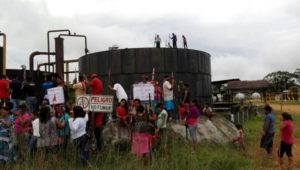
|
On Tuesday, an Amazonian tribal chieftain announced that hundreds of Indigenous people living on Peru’s largest oil field concession seized facilities operated by the Canadian oil company Frontera Energy Corp. They took control of oil drums and demanded that the government apply an existing indigenous rights law before signing any new contracts with the company. Nearly 25 representatives from some 120 Indigenous communities have been in Lima since Monday to talk with the government officials about the issue, and warned of similar protests if their demands were not met soon. Comment: A “prior consultation law” passed in 2011 requires the government to seek input from Indigenous people prior accepting development plans. Frontera, which produces roughly 7,500 barrels a day, stated that it values community consent and is willing to act as mediator to ease tensions between Indigenous people and the government. Frontera’s two-year contract is due to expire this month, but according to tribal chiefs in the area’s Block 192, the government has refused to consult them prior negotiations to extend the license. (El Comercio, APTN News, Telesur, Reuters)
Researched/Written by Nastasia Stipo
|
|
|
|
|
| |
This week in East Asia & Pacific
|
|
|
|
| |
CHINA/HONG KONG: Thousands of citizens march in protest against jailing of democracy activists
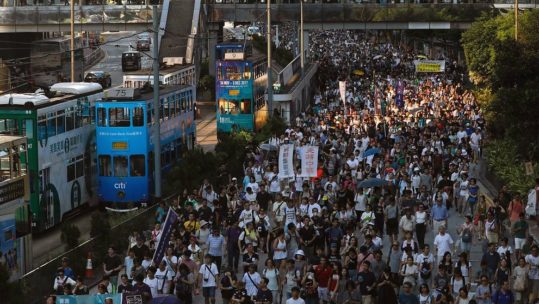
|
|
On Sunday, thousands of Hong Kong citizens marched in protest after three young democracy activists – Joshua Wong, Nathan Law, and Alex Chow – were sentenced to six-to-eight months of jail time for their role in instigating the 2014 pro-democracy “Umbrella Movement” protests. An estimated 22,000 protesters marched to the Court of Final Appeal, chanting “Release all political prisoners,” and displaying banners reading, “It’s not a crime to fight against totalitarianism.” In response, Hong Kong Chief Executive Lam defended the ruling of the court, insisting that the arrests were not politically motivated. Comment: Joshua Wong, Nathan Law, and Alex Chow were convicted on charges of “unlawful assembly” for the illegal occupation of legislative headquarters in 2014, instigating the mass “Umbrella Movement” protests. Although initially sentenced to non-prison terms, the justice department applied for a review seeking imprisonment of the perpetrators. (Channel News Asia, South China Morning Post, BBC)
|
|
|
|
|
| |
MYANMAR: Commission offers final report on tensions in Rakhine State to Myanmar Government
On Thursday, former UN Chief and Rakhine State Advisory Chairman, Kofi Annan presented the official report on Rakhine State to the Myanmar government. The report, titled “Towards a Peaceful, Fair and Prosperous Future for the People of Rakhine” outlines 88 recommendations for improving the ethnic, political and economic stability of the region. The report significantly addresses human rights abuses against the often persecuted Muslim Rohingya minority, warning the government that continued political and economic marginalization of the population would fuel militant extremism and radicalization in Rakhine State. The commission proposed removing current restrictions on Rohingya citizenship and immigration. Comment: The Rakhine State Advisory Commission, consisting of six Burmese analysts and three foreign members, was formed last September by Suu Kyi to the poor regional development and simmering ethnic tensions between Buddhists and the Rohingya Muslim minority in Rakhine State. The Muslim Rohingya, an ethnic minority in Myanmar that are denied citizenship and considered illegal immigrants by the Burmese government, are often subject to political and economic persecution. (Frontier Myanmar, Eleven Myanmar, Aljazeera, Channel News Asia)
|
|
|
|
|
| |
SOUTH KOREA: U.S. and South Korean forces continue with war games despite tension with North Korea
| |
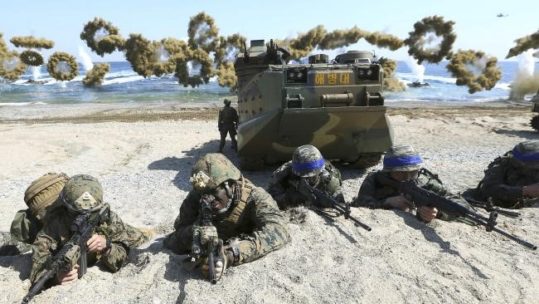
|
On Monday, 50,000 South Korean and 17,500 US troops hosted Ulchi Freedom Guardian, an annual series of computer simulated military war games. Spanning 10 days, the military drills are aimed at evaluating military, civilian and government preparedness in the event of war. Despite insistence from the Pentagon and South Korean government that the drills are defensive in nature, the North Korea’s news agency KCNA claimed the exercises were “aimed to ignite a nuclear war on the Korean peninsula at any cost.” Russia and China have urged South Korea and the U.S. to cancel the military exercises due to the increase in tensions between South and North Korea. Comment: In response to the military exercises last year, North Korea fired a submarine ballistic missile two days before the games began and conducted its fifth nuclear weapons test the following month. The current simulation is the second in a series of revised games designed to reflect North Korea’s new nuclear power. (Channel News Asia, The Chosunlibo, Reuters, New York Times)
Researched/Written by Laura Bisbee
|
|
|
|
|
| |
This week in Europe & Central Asia
|
|
|
|
| |
FINLAND: Investigations and arrests continue in connection with the country’s first terror attack
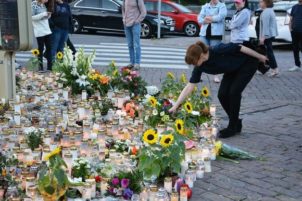
|
|
On Wednesday, two more men were arrested in Finland on “reasonable suspicion of preparing an offence to be committed with terrorist intent” after last week’s knife attack in Turku, in which two were killed and eight more injured. The main suspect, a rejected asylum seeker from Morocco who admitted to stabbing ten people, and three other Moroccans suspected of being involved had already been arrested. These four individuals have denied any terrorist motives or terrorist group affiliations, yet are facing charges of murder with terrorist intent and attempted murder with terrorist intent. Comment: On Thursday, Finland’s National Bureau of Investigation said that it had released one of the suspects arrested Wednesday. According to the Finnish intelligence agency SUPO, authorities had received a tip earlier in the year that the main suspect “appeared… to have been radicalised (sic),” but a SUPO spokesperson declined to elaborate. Finland’s President responded to the attack by encouraging Finns to try and understand people on both sides of the issue of immigration, asserting “hate prevents us from preparing against evil.” (YLE, Finland Today, Helsinki Times, The Local, BBC)
|
|
|
|
|
| |
POLAND: EU will not drop case against Poland over migrant quotas; Poland vows legal battle
| |

|
On Thursday, the European Union’s executive office announced that it would not be withdrawing their legal case against Poland for failing to reach their country’s quota on migrant relocation. This announcement came one day after Poland’s foreign ministry sent a motion to the European Commission requesting that their infringement proceedings be dropped. The ministry cited recent terror attacks as reason for Poland to argue its case against meeting EU migrant quotas in front of the European Union Court of Justice. Polish Prime Minister Beata Szydło commented on Saturday that the migration policies of Europe’s leaders have been “benefiting those who are now sowing death” among Europe, and asserted that Poland will not participate in such policies – a sentiment echoed by Interior Minister Mariusz Blaszczak, who blamed the migration policies directly for the latest attacks in Spain and Finland. Blaszczak also claimed that uncontrolled migration is a “noose around Europe’s neck,” and that Poland has not been attacked because the country has resisted the compulsory migrant quotas. Comment: Poland’s ruling Law and Justice (PiS) party has vehemently opposed all EU policies for relocating and absorbing migrants, and consistently argues that migrants pose the largest security threat to the country. Poland is one of just two countries in Europe, along with Hungary, who have yet to accept any refugees from camps in Italy and Greece as part of an EU program to resettle those fleeing from the Middle East and Africa. (Lifezette, Radio Poland 1, 2, 3, EU Observer, Reuters)
|
|
|
|
|
| |
RUSSIAN FEDERATION/UKRAINE: Leaders recommit to ceasefire ahead of new school year
On Wednesday, the Trilateral Contact Group, made up of representatives from Ukraine, Russia, and the Organization for Security and Co-operation in Europe (OSCE), met in Minsk and reiterated their full commitment to a permanent ceasefire between Ukraine and Russia to begin at midnight on August 25. This ceasefire is fully supported by leaders of the “Normandy Four” – Russia, Ukraine, France, and Germany – and comes before the start of the new school year in eastern Ukraine on September 1, a day marked by violence in past years. Russia and Ukraine have also recommitted to implementing the measures outlined in the last official peace agreement, the Minsk Peace Protocol of 2015. Comment: The ceasefire comes just one month after Russian-backed rebels killed nine Ukrainian troops on what the U.S. State Department called the area’s “deadliest one-day period in 2017.” According to the UN, more than 10,000 people have died since the eastern Ukraine conflict began with the 2014 Russian annexation of Crimea, and all previous ceasefires have failed. (Ukrinform, TASS, DW, BBC 1, 2 OSCE)
Researched/Written by Natalie A. Landau
|
|
|
|
|
| |
This week in the Middle East & North Africa
|
|
|
|
| |
EGYPT: U.S. to withhold up to USD 290 million in Egyptian aid
On Tuesday, the United States denied USD 95.7 million in aid to Egypt and delayed an additional USD 195 million as a rebuke for a lack of progress on respect for human rights and democratic norms. Of particular concern to U.S. officials is a new NGO law that went into effect in May that regulates non-governmental organizations and introduces jail terms of up to five years for non-compliance with the law. According to Egyptian lawmakers, the NGO law is needed to protect national security. On Wednesday, Egypt criticized the U.S. decision stating that it reflects “poor judgment.” Comment: Egypt is the world’s second-largest recipient of U.S. aid at about USD 1.3 billion annually. For the U.S., Egypt has an especially crucial role in the middle east, because it has the strategic Suez Canal and it shares borders with Israel. (Al-Ahram, BBC, Reuters, The Washington Post)
|
|
|
|
|
| |
ISRAEL/PALESTINE: Israel destroys Palestinian schools on eve of new school year
On Tuesday, the night before term began, Israeli authorities demolished a Palestinian school located between four Palestinian villages on the outskirts of Bethlehem in occupied west bank; local authorities and international NGOs partnered with the European Union to build the basic structure. Earlier this week, a kindergarten structure in a Bedouin Arab community in eastern Judea was confiscated, and a small primary school was demolished in southern Judea. Israeli officials say the structures did not have proper permits. Comment: Over the last two weeks, four Palestinian communities have seen their educational facilities, donated by international bodies and NGOs, destroyed on the grounds that they had been built without proper planning permission. (Norwegian Refugee Council, The New Arab, Arutz Sheva, The Independent)
|
|
|
|
|
| |
YEMEN: Air strike on hotel outside of Sanaa leaves 30 dead
On Wednesday, at least 30 people were killed in a Saudi-led coalition air strike on the outskirts of Yemen’s capital, Sanaa. Witnesses said warplanes bombed a hotel in the Arhab district, about 12 miles north of the city. Other strikes reportedly targeted rebel positions to the southeast. There was no immediate comment from the coalition, which is backing President Abdrabbuh Mansour Hadi’s government in a war against the rebel Houthi movement. Comment: According to the UN, more than 8,167 people have died and 46,335 injured in air strikes and fighting on the ground in Yemen since March 2015. (The Guardian, The Independent, Reuters)
Researched/Written by Atika Alkhallouf
|
|
|
|
|
| |
INDIA: Supreme Court rules privacy as right of every citizen
On Thursday, the Indian Supreme Court unanimously declared privacy as a fundamental right of every citizen, primarily in effort to end mandatory biometric IDs. Comment: Biometric IDs, or “Aadhar Cards” record the fingerprints and eye scan of each citizen, and are used by various government agencies and private organizations to obtain rations, wages and pensions. In 1954 and 1962, the Court ruled that privacy was not fundamental. Constitutional experts say the decision may impact broader civil rights, such as privacy regarding family, marriage, procreation and sexual orientation, such as decriminalizing homosexuality. (India Today, Washington Post, Reuters)
|
|
|
|
|
| |
MALDIVES: Death penalty to be restored
On Tuesday, Mohamed Hussain Shareef, a senior advisor to President Abdullah Yameen announced Maldives will reintroduce the death penalty after a 60-year moratorium. Shareef says the hangings will not be carried out in public; the government will construct a special execution chamber on Maafushi Island. The UN and Amnesty international discouraged the decision; the UN is concerned with prisoners receiving fair trials while Amnesty International believe the executions are a distraction from the government’s issues with its recent corruption claims in the Yameen administration. Comment: This decision comes shortly after the Maldives army occupied parliament to block a no-confidence vote to impeach the speaker of the house on Tuesday. (The Wire, Hindustan Times, Amnesty International, The Guardian, Reuters)
|
|
|
|
|
| |
REGIONAL: President Trump reveals South Asia strategy
On Monday, President Trump addressed his “regional” strategy on South Asia, included plans on Afghanistan, Pakistan, and India. Trump committed to continued military engagement in Afghanistan, although did not provide a clear method on how to measure progress or a specific number of troops the U.S. plans to deploy. He called on Pakistan to eliminate militant sanctuaries and to crack down on Taliban fighters hiding in Afghanistan. U.S. Secretary of State Rex Tillerson says the U.S. would consider cutting off Pakistan’s status as a major non-NATO ally if Pakistan doesn’t crack down on Taliban and other extremist groups. Trump urged India’s involvement with Afghanistan through economic assistance and development, threatening commercial repercussions if India does not oblige. Comment: Analysts say Trump’s warning to Pakistan could backfire. In addition, analysts say Trump’s trade threat could irk India, who is a strong counter terrorism ally of the United States, but was otherwise quite likely content with Trump’s remarks. (AP, 1, 2, 3, 4, The Guardian, The Washington Post)
Researched/Written by Rabia Uddin
|
|
|
|

|
|